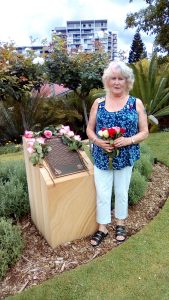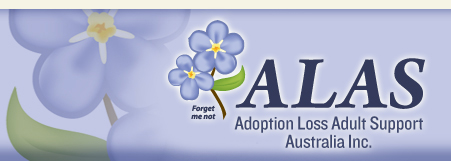Trish Large gave birth to her son on 17 October 1968, but it would be 22 years, 11 months, four days, five hours and 45 minutes of heartbreak before she would see him.
She had just turned 20 and had to be forcibly restrained as her baby was taken from her as soon as he was born.
As the president of Adoption Loss Adult Support (ALAS) since 1992 and before that the North Brisbane Birth Mothers Support Group, Trish has spent a lifetime fighting for the rights of victims of forced adoption.

In 2019, Trish was awarded an OAM for her work as an adoption justice activist.
“I was keeping my baby and taking him home. I wasn’t giving him up for adoption,” recalls Trish. “But they took him straight from me. I never saw him or held him. I was tied to the bed.”
Trish had supported herself through her pregnancy as her mother had thrown her out when she found out that she was pregnant. But what she didn’t know was that her mother–at a time when the age of consent was still 21–had signed the forms for the baby’s adoption.
“My mother told them she didn’t want the baby coming home,” says Trish. “I didn’t even know that my parents could do that behind my back.”
Trish’s family had arrived from England as ‘Ten-Pound Poms’ in April 1967 and, as they had only a small house, it was made clear to Trish, the oldest child, that she would have to get out and find her own accommodation.
Trish accepted a live-in job and ended up pregnant to the son of the family, who was two years her junior: “I thought he loved me.”
It was a difficult birth. The baby’s head was misshapen by the forceps delivery and Trish was exhausted but all she wanted was to hold her baby.
“The young doctor said he would get him,” Trish recalls, “and I heard him tell the sister: ‘the mother wants to see her baby. It’s her right’.”
Instead, the sister stormed in, telling the young mum, “You are under 21, unmarried, unemployed and unfit to see, hear, hold or touch this baby,” before slamming the door as she left.
Trish’s newborn son, who she named Alan, was put in a locked nursery and Trish’s nightmare began.
Trish refused to sign the consent forms or to name the father, insisting that she would be taking the baby home.
Then a social worker arrived to say they had learnt the identity of the baby’s father and that Trish would be charged with seduction and deported if she didn’t sign the consent form.
Trish was given Stilboestrol, a lactation suppression drug that’s now a banned carcinogenic, every day until she left hospital. Trish has since gained access to her full hospital file through Freedom of Information, which she says shows that her dosage was three times the legal limit.
Trish also had her breasts bound by three nurses, one with a knee on her back, who wrapped an elastic bandage from the top of her chest to her waist so tightly that she could barely breathe.
“I had been doing some embroidery and had a small pair of nail scissors which I used to cut the bandage off later that evening,” recalls Trish. “There were big red welts across my back. It looked like I had been whipped with a cat o’ nine tails.”
The deportation threats continued for days until 25 October, when a social worker arrived with a clipboard and a brown envelope and announced, “Good news. You and the baby are medically fit to leave hospital. Sign here.”
Believing this meant they would be leaving together, Trish signed. But at about 5pm Trish asked the nurses if she could go and dress her son and get him ready to go home with her. The nurses laughed, addressed Trish in foul, abusive language and said, “… he has already left the hospital with his adopted parents this morning”. The nurse yelled, “If you don’t like it take it up with the social worker from Child Safety on Monday.” But that night, Trish returned to her parents’ house feeling utterly devastated.
When Trish went to the child safety department, she was told they had never handled a case for Patricia Large and she needed to go to the Royal Brisbane Hospital to get proof the baby existed.
There, the response was the same: “There’s no Patricia Large here. You never gave birth at this hospital.”
Next, Trish tried the police who sent her back to the hospital for proof that she’d even had a baby.
Trish vowed she wouldn’t stop fighting and she didn’t for over 22 years.
In 1985, the contact register was introduced, and Trish learnt that Alan had been adopted on 8 November 1968 and was named Darren. She was given the occupation of his adoptive parents but not his surname and didn’t even know if he was still alive. There was nothing to identify him.
Trish continued lobbying. Wayne Goss’ state government changed the laws in 1990 and finally, on 5 June 1991, Trish heard what she had been wanting to know for more than two decades—her son’s full name.
It would take another few months to find the son, but on 21 August 1991, Trish was finally reunited with her firstborn.
“We made ourselves a promise that never again in our lifetime would anyone ever come between us,” says Trish. “He’s got grey hair now, but he’s still very handsome.”
On 19 May 2009, the Royal Brisbane Women and Children’s Hospital gave ALAS what would be the world’s first hospital apology for forced adoptions.
Queensland Forced Adoption Apology is celebrated every year on 27 November since 2012. Members of ALAS meet at the Commemorative Plaque, in the Roma Street Parklands Memorial Corner, every year to support each other and honour the lived experience of forced adoption. If you would like to join the commemoration activities or learn more about ALAS, further information can be found on their website.
Trish Large: 0417077159
Adoption Loss Adult Support Australia

